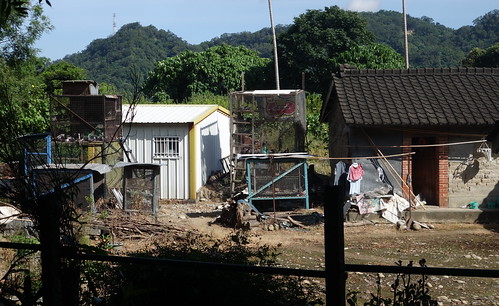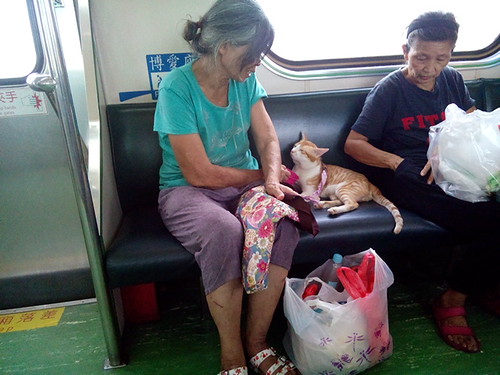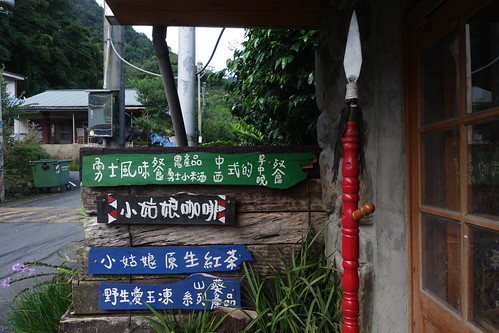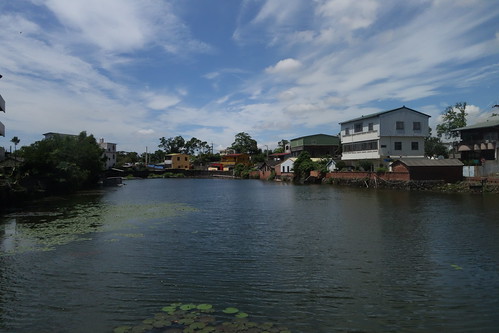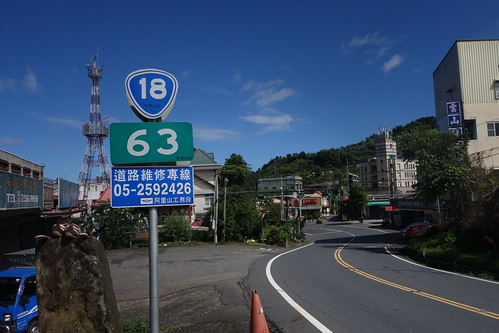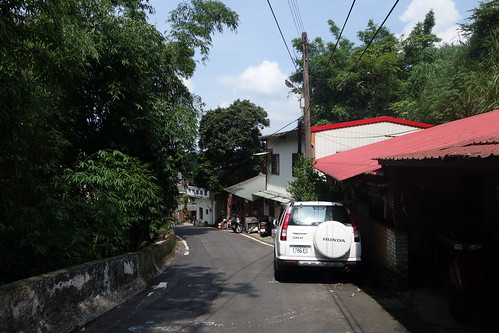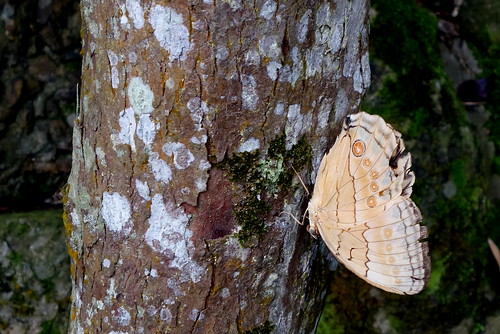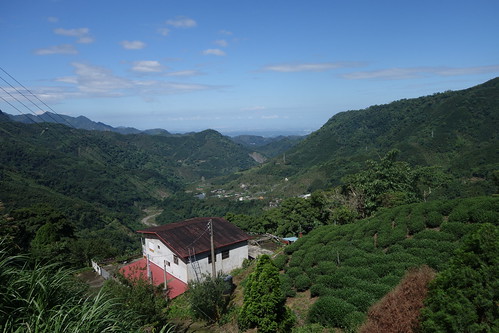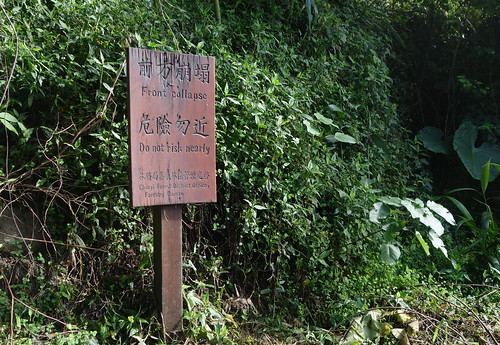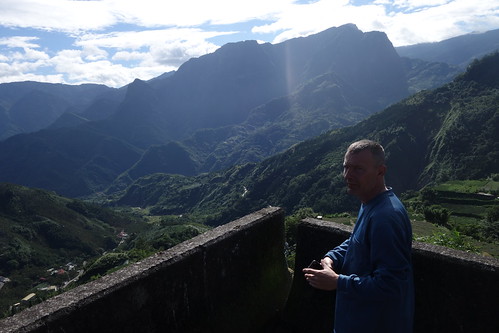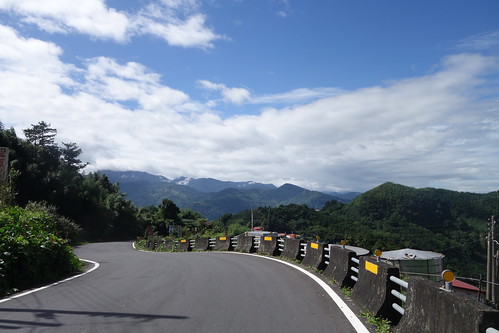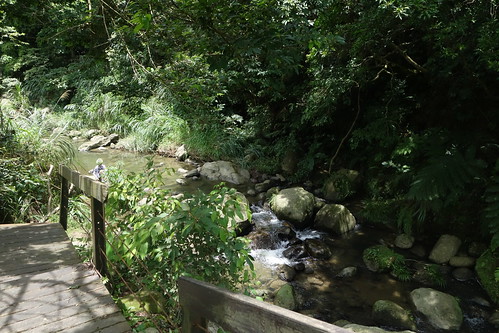One thing I like about Taiwan: dogs and cats go everywhere with their people.
A while back I was having some tests done at the hospital. I'm lying there on the table (biking bonus: resting pulse is 61) and the tech is having a chat with me while we wait for the meds to kick in:
where are you from, how do you feel about Taiwan? etc. "Oh, I love Taiwan. People are so friendly." "Yes," he agreed, "we are friendly to everyone except to those..." his voice drops "mainland Chinese."
It should be obvious by now to anyone who has spent at least twenty minutes on Taiwan that (1) Taiwanese do not like their Chinese counterparts and (2) the drop in Chinese tourists is widely welcomed in Taiwan because (3) Chinese tourism, especially tour groups, is a net negative for the island.
Nevertheless, surprisingly, this got posted to ChinaPol by a leading Taiwan scholar and was leaked to me with knowing winks by several people, and crossed over to other discussion groups which I am on (this frequently happens with ChinaPol posts, it's so cute that they think they can keep stuff on the internet secret). ChinaPol has never let me join, because god knows what would happen if bloggers and other riff-raff were permitted to join. Here's the comment. After the author is surprised to find unconcern about the tour groups vanishing during a recent visit to Taiwan, the author writes:
To be honest, I’m skeptical. I heard the same thing last summer in Greece (about German tourists: who cares whether they come or not? They just stay at German-owned hotels anyway), and it sounds a lot like a rationalization. I also don’t know how pervasive these views are.
However, if what we care about here is the politics, if people believe the benefits of Chinese tourism are limited, that’s what matters. If Taiwanese have persuaded themselves that PRC tourists are not really helping the economy, reducing their numbers is not going to put pressure on Taiwan in the way Beijing might hope.
I would be interested to know if anyone is asking about this in surveys.
"Surprisingly unconcerned!" I don't know how anyone who knows anything about Taiwan could find the Taiwanese attitude "surprising". More like, inevitable...
First of all, let's look at some survey data, and then we will take the Scholar's remarks. Here is
survey data from Taiwan ThinkTank on this issue from Oct 2015:
9. There is word that China will greatly reduce the number of Chinese tourists visiting Taiwan. Some believe that to avoid injury to Taiwan’s tourism industry, the new government should accede to the demand to accept the 1992 Consensus. Some others believe that the new government should use this opportunity to expand tourism from other countries and lower dependence on China. Which stance do you agree with?
Increase Tourism from Other Countries: 78.1%
Accept 1992 Consensus: 13.5%
Undecided: 8.4%
10. If the number of tourists were to increase, would you prefer more tourists from China or more tourists from other countries?
More from Elsewhere: 85.1%
More from China: 6.6%
Undecided: 8.3%
More from Elsewhere = 85%. Nobody wants more tourists from China. Taiwanese know China tourists suck. They know that Chinese tourism is part of a larger strategy to hollow out Taiwan's industries and
to annex the island. They know that places where Chinese go in great numbers soon become inhospitable and bereft of locals. Many hotels don't accept Chinese tour groups -- they evade censure by having a "no tour groups" policy, which everyone understands is aimed at Chinese tour groups. Many hotels routinely place them on floors of their own, since they wreck whatever rooms they are placed in with their incessant smoking, noise, constant eating, and fights with management. They behave horribly, and why shouldn't they? They are treated like cattle, like crap, like money trees (I've had nothing but uniformly pleasant experiences with individual Chinese travelers). I know this myself, because I sometimes am stuck on those floors when I travel (management has sometimes apologized to me for that). These facts are widely reported in the media, on blogs, on Facebook, Twitter, and other social media. It's 2016, and these things should be known to people who regularly comment on Taiwan and its politics.
But what is this massive economic effect that those dumb Taiwanese who don't know their own country are missing and cover with noise that "sounds a lot like rationalization" and against which they "persuade themselves".
Taiwan's GDP in 2015 was ~$528 billion US (
source) or 523 billion US (
source). So around $520 billion. Let's take $500 billion as a rough GDP figure for the recent period, because it's smaller.
Tourism as a whole is 2.1% of the Taiwan economy (
WTTC). In 2014, Taiwan's international tourism receipts were $14 billion dollars, according to
AmCham. Looking at AmCham, in 2014 3.98 million Chinese (~40% of all tourist arrivals) visited Taiwan, spending -- according to inflated government figures -- $241.98 each
a day. In our $500 billion economy, that's over $6 billion or right around 1% of the economy. Not very much [
update: $242 is a daily figure. Assuming a 7 day stay, multiply accordingly to ~$7 billion. Still tiny compared to the economy as a whole. Thanks for pointing out this error, Kenneth. Remember, the government figures are inflated.]
Now let's imagine that Beijing in its fury at Tsai Ing-wen slashes tourism in half. That means the tourism sector will miss about $3.5 billion, using the inflated government numbers. In our $500 billion economy, that's... not much.
Nobody will miss the Chinese tourists except a few businesses deliberately built to exploit those always political flows. They will be featured prominently in the media, especially the pan-Blue media. But the vast majority of Taiwanese won't miss them and won't even notice they are gone. This is especially true because other inbound tourism from Korea, Japan, and SE Asia is on the rise.
Further, as AP showed years ago,
the government numbers are inflated. Those billions aren't really billions. Moreover, as has been repeatedly reported in the English and local language media, tourist companies from China are slow to pay, or don't pay their debts to Taiwan firms. The recent slashes in tourism have resulted in a
wave of bankruptcies here in Taiwan. Chinese tourists
don't pay their medical debts either. Because this non-payment will disappear, the net effect of Chinese group tourism declines will not be very great.
But there's more. A while back I found
this excellent paper looking at the overall effect of Chinese tourism even using those inflated numbers. And it was found to be tiny once you factor in everything. The paper observes, using the inflated numbers:
The results from the CGE analysis show that an increase in Chinese visitors to Taiwan is overall beneficial to the economy: the Taiwanese household’s welfare would increase by US$145.1 million (0.06%).
The benefit per household is pocket change. Again, no one will miss it -- most of it doesn't trickle down anyway, but is captured by a few firms, largely China or Hong Kong based.
But wait. What is the net benefit? Relying on the literature on the effect of tourism, there are two separate negative effects:
This, coupled with an expected appreciation in the Taiwanese dollar, means that Taiwanese computers and electrical goods become more expensive on the world market. The overall effect is a contraction of this sector with a high export component.
The first negative effect occurs because Taiwan has X capital and labor resources to put into its different markets. If lots of resources, such as investment capital and trainable labor, are going into the tourism sector because returns are suddenly good, that means they are not going into the technology export sector. That hurts that sector. The CCP and the KMT both know this -- that is why they are pushing tourism: it hurts Taiwan's real export industries. Moreover, if tourists are suddenly cut, all that investment is sunk and not easily transferred to other industries. That hurts Taiwan.
The other effect is the value of the NT dollar. When Chinese tourists enter Taiwan, in order to engage in economic transactions, they purchase NT dollars. Like any other good, when demand for money rises, the price of money rises. This pushes the NT up. That rise in the NT pushes down exports. When those tourists stop coming, the upward pressure on the NT relaxes. The NT falls slightly, helping our real exports.
Thus -- let's savor this for a moment --
when Chinese tourists fall, our tech export sector rises. And that export sector drives increased knowledge externalities, production skills, and rises in standard of living -- the tourist sector has no comparable effect.
I don't know what the numbers are, so it I don't know whether the effect of the investment shift and currency fall offsets the effect of the fall in tourists. But there is a definite upside to the drop in Chinese tourists that has nothing to with the positive effect of the tour groups vanishing from our roads and scenic areas.
The Taiwanese may or may not be aware of this, but it is abundantly clear that certain sectors of the scholarly world need to install Google in their computers.
But let's address one final point. Is Beijing "putting pressure on Taiwan?" Well, maybe...
Outbound tourism is, by definition, an import. Like any import, you send money out, and something comes back -- refrigerators, clothing, food, or, in the case of tourism, experiences.
As everyone not living in a cave knows, China's economy hasn't been performing well of late. Suppose you were Beijing and wanted to cut imports to maintain your export surplus in a time of struggling economic performance? Well, you can't really cut certain imports like oil or food or electronic parts or minerals, because you need them to make stuff that you export. But outbound tourism? That's easy. It doesn't hurt Beijing at all if tourists spend money in Szechwan instead of Suao. The overall effect is tiny, but it doesn't hurt.
Taiwan is usually one of China's top markets for outbound tourists. For example,
in the second half of 2015, Taiwan was number 2. By cutting outbound tourism to Taiwan, which has always been political anyway, Beijing not only plays to the international media and academic worlds, which love a good ZOMG TAIWAN IS TENZ! story and are always happy to spread Beijing propaganda by noting that Beijing is "punishing" Taiwan,
but also reduces its imports.
So what's the real driver of the tourism cut to Taiwan? You tell me.
_______________________
[Taiwan] Don't miss the comments below! And check out my blog and its sidebars for events, links to previous posts and picture posts, and scores of links to other Taiwan blogs and forums!
